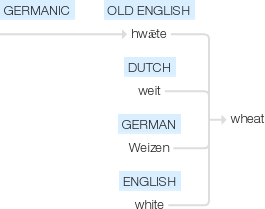Wheat
Old English hwǣte of Germanic origin; related to Dutch weit, German Weizen, also to white.
wiktionary
From Middle English whete, from Old English hwǣte, from Proto-West Germanic *hwaitī, from Proto-Germanic *hwaitijaz (compare West Frisian weet, Dutch weit, Low German Weten, German Weizen, Danish hvede, Swedish vete, Norwegian Nynorsk kveite, Icelandic hveiti), from *hwītaz(“white”). More at white.
etymonline
wheat (n.)
Old English hwæte "wheat," from Proto-Germanic *hwaitjaz (source also of Old Saxon hweti, Old Norse hveiti, Norwegian kveite, Old Frisian hwete, Middle Dutch, Dutch weit, Old High German weizzi, German Weizen, Gothic hvaiteis "wheat"), literally "that which is white" (in reference to the grain or the meal), from PIE *kwoid-yo-, suffixed variant form of root *kweid-, *kweit- "to shine" (see white; and compare Welsh gwenith "wheat," related to gwenn "white"). The Old World grain was introduced into New Spain in 1528. Wheaties, the cereal brand name, was patented 1925.
